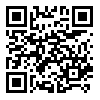Thu, Dec 25, 2025
| فارسی
Volume 15, Issue 1 (7-2020)
bjcp 2020, 15(1): 53-67 |
Back to browse issues page
Nasrin Baghaei1 
 , Mohammad Reza Saffarian Toosi *2
, Mohammad Reza Saffarian Toosi *2 
 , Gholamreza Khoy nezhad3
, Gholamreza Khoy nezhad3 
 , Gholam Reza Khadivi Rofugar3
, Gholam Reza Khadivi Rofugar3 


 , Mohammad Reza Saffarian Toosi *2
, Mohammad Reza Saffarian Toosi *2 
 , Gholamreza Khoy nezhad3
, Gholamreza Khoy nezhad3 
 , Gholam Reza Khadivi Rofugar3
, Gholam Reza Khadivi Rofugar3 

1- Ph.d student of Counseling and Guidance, Mashhad Branch,Islamic Azad University, Mashhad,Iran.
2- Assistant Professor, Department of Educational Sciences,Mashhad Branch,Islamic Azad University, Mashhad,Iran. ,Saffarianreza1965@gmail.com
3- Assistant Professor, Department of Educational Sciences,Mashhad Branch,Islamic Azad University, Mashhad,Iran.
2- Assistant Professor, Department of Educational Sciences,Mashhad Branch,Islamic Azad University, Mashhad,Iran. ,
3- Assistant Professor, Department of Educational Sciences,Mashhad Branch,Islamic Azad University, Mashhad,Iran.
Abstract: (5831 Views)
Research literature indicates that adolescence is a period of rapid biological, cognitive and social changes which affect adolescents’ health and their psychological well-being. So the present study aimed to study the effect of mediation role of loneliness on alexithymia and psychological well-being in adolescent girls with psychosomatic problems. Among all high school female adolescents who in 2017-2018 were referred to Mashhad education district 2 school counseling centers with psychosomatic problems complaints, 103 adolescents were selected, on the basis of cluster sampling method and using the Psychosomatic Problems Scale for screening. Participants also responded to the following questionnaires: Psychological Well-being (Ryff), Alexithymia Scale (Torento), Fear of Negative Evaluation (Leary) and Sense of loneliness (Dehshiri et al). After the questionnaires were administered and the data was collected, data analysis was performed using descriptive and inferential (multivariate analysis and structural equation modeling) statistics using SPSS 24 and Smart PLS 2. Findings demonstrated that alexithymia significantly and negatively correlated with psychological well-being among female adolescent and loneliness partially mediated this relationship. Results of this study may be considered a reminder to Education officials of the importance of planning and providing appropriate educational and therapeutic packages in order to increase the psychological well-being of students, considering their feeling of loneliness and the problem of alexithymia so as to reduce students’ psychosomatic problems.
Article number: 5
Keywords: psychological well-being, alexithymia, loneliness, psychosomatic problems, female adolescent
Type of Study: Research |
Subject:
Special
Received: 2019/06/4 | Revised: 2022/03/29 | Accepted: 2021/09/27 | Published: 2022/02/7
Received: 2019/06/4 | Revised: 2022/03/29 | Accepted: 2021/09/27 | Published: 2022/02/7
Send email to the article author
| Rights and permissions | |
 |
This work is licensed under a Creative Commons Attribution-NonCommercial 4.0 International License. |


